#what i've learnt from this is that we're ALL rabbit holing disasters
Explore tagged Tumblr posts
Note
Poetry + Names? :D!!!! Can't resist adding ~
Stacking on to Hunxi's 晓星尘 example
How to search for possible poetry references Another great resource that I love a lot besides gushicimingju and gushiwen (highly recommend the gushiwen app for its clean and user friendly interface if you're interested in reading poetry/exploring classics and keeping track of what you've learnt) is sou-yun.cn, which is particularly useful for searching up names and possible references because there are lots of parameters for advanced searching to chose from - like exact vs approximate match, position, dynasty etc.
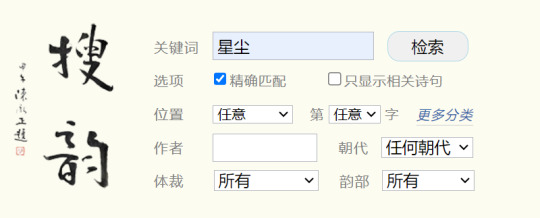
Results are returned in their full poems with the text highlighted per the image below this paragraph. With the textual instability of ancient poems and all, you sometimes get alternate words - this site also displays them and their source, as you can see in the first example.

What's even cooler is that, hey, they may recognize me but I sure don't know them! What do these characters mean together? Click into the poem, select the word and you get both the pinyin and examples of usages in other poetry.
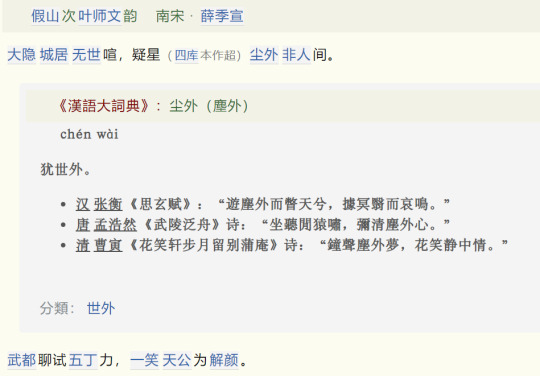
(I try to look at this only after doing the legwork for poetry club though, because this is seriously too much of a golden finger and my searching skills may grow rusty LOL)
Gushicimingju is fantastic for the purpose of telling us how many instances does the word show up. Gushiwen actually returns results from texts as well as poetry which is also desirable because name inspo for Chinese characters is not limited to poetry and auspiciousness. If you select the 古籍 tab (indicated with a red dot below) and if the search term actually exists in any of the texts within the site's archive, then it will turn up. In this case for 星尘, there is none.

But besides all these bells and whistles, the difference between these sites is the pool of works available. Gushiwen only returned 5 results with 星尘 across the Song to Qing Dynasties. Sou-yun.cn gave me 9 from Song to Late Qing, and a further 7 from the Republican Era to our times. See below xD

/got sidetracked LOL
Oh, ctext is another of my fav go-tos as well!!!! But we all know that the search function there can be a little bit broken sometimes. So when you suspect that it's not working for you, a workaround is googling like this: "the characters you're looking for" ctext.
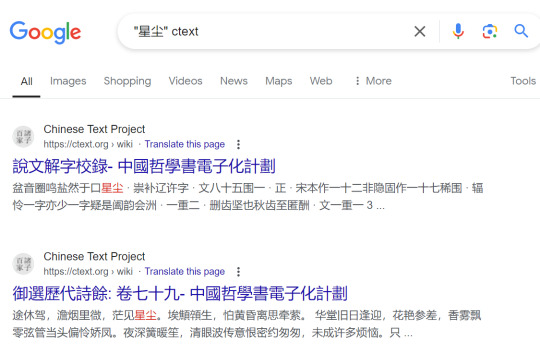
But let's say we're looking for something different, so you want to search within the site. And if for some reason, you want to know if a particular usage of a word was more popular in older texts (like Pre-Qin and Han) or later ones (like Wei-Jin and after), then use the search box like this!

星辰 with 'Pre-Qin and Han' selected returns 177 results. 星辰 with 'Post Han' selected returns 385 results.
Another method of researching a name Looking at the words themselves! Sometimes a return to simplicity works just as well (or maybe I just like digging many rabbit holes).
The Chinese baike.baidu (like wikipedia) these days has this cool etymology section 字源解说 at the beginning of the article for most words.
If you've ever wondered how people from the Shang Dynasty wrote the same word (ok it's not as simple as that xD but for the sake of not making this a long ramble let's go with this), there we go.
For 晓

And since this is a surname, don't forget to check out its origins!

For 星

For 尘

What did the words mean originally? How did they extend and drift to other meanings and when were these drifts becoming popular? Does it fit in with what you know of the character?
Does the conclusion you're drawing about the meaning of their name feel a bit forced, or does it make perfect sense and you're happy to make this your headcanon / share it as a possible fun fact?
Happy searching!
so I know that a lot of chinese names are references to specific poems. Is there a way to determine this (vs general auspicious meaning) and which poem specifically? I'd love to be able to figure this out for character names and I haven't been able to find any resources (in case it's helpful, I'd say I'm my understanding is maybe HSK4-level so I can clumsily make my way through the chinese internet with the help of a dictionary)
feel free to make this public so that others can benefit if you have any suggestions
oof... unfortunately I suspect that this, along with one's repertoire of chengyu, is something that one simply Just Learns with reading more. my personal repertoire of poetry is embarrassingly thin, so the horrible horrible process I've been going through is, well, throwing the name into a search bar and hoping for the best.
here's an example of how I (think I) went about doing this for Xiao Xingchen's name, way back when I wrote this post:
I went ahead and dropped "星尘 诗词" ("Xingchen poetry") into the search bar, which turned up this:

Generally speaking, I'll only put the name (minus the surname) because putting the character's full name into a search bar will probably turn up the character themselves, and if someone's name is being derived from a poem, it's usually independent of the surname anyway.
Xiao Xingchen's name is an interesting example because it doesn't quite come from a poem, but it doesn't not come from a poem. you can see that the search engine has automatically assumed that I am looking for poems about constellations, as "星辰" and "星尘" are homonyms, and one of these is more commonly seen. I usually consider that a solid indication that "星尘" (the name) is a novel formation of characters in a name, and not likely a poetic reference.
but! in for a penny, etc. I'm a huge fan of the first search result, gushicimingju, since it's a solid database of poetry and some prose. clicking into that listing informs me that gushicimingju is turning up. oh my. 119 possible matches:
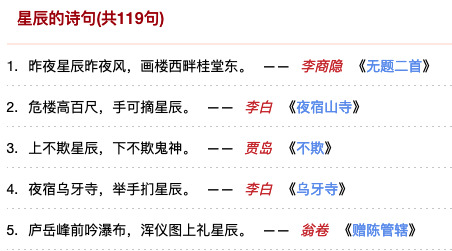
note that these are matches for "星辰" (constellation), not actually our character's name. still! you can click in and peruse the selection if you'd like.
now that you're on gushicimingju's site, you can also use the search function within the site to search for more exact matches, without worrying that you'll accidentally activate the fandom itself.
looks like there's a few matches for "晓星," but nothing for the full name.
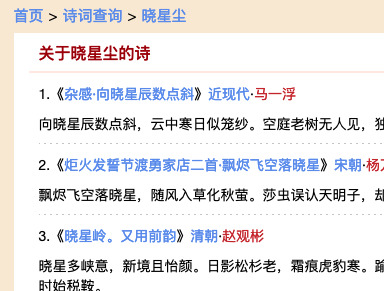
so! gushicimingju is a solid database I like to refer to most of the time. if for some reason I'm feeling particularly academically rigorous, I might also do some searches on ctext as sometimes names will come out of famous turns of phrases (a la Zhao Yun 赵云 / Zhao Zilong 赵子龙 from that post I linked earlier) rather than poems. searching the dictionary sometimes (Pleco, or zdic) doesn't hurt either. basically, I throw spaghetti at the search engine wall to see what results come back for these characters in this particular order to try and get the original referent (if any) to show up; I'll probably give up after a few permutations of search terms if nothing is actively jumping out at me
but back to the search results: sometimes, if your character is famous enough, straight up searching for "what poem is this character's name from?" will help you find like-minded people on baidu zhidao (basically yahoo answers):
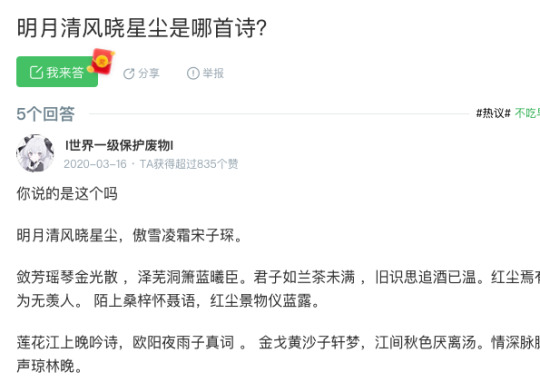
although of course, take baidu zhidao result with all of the salt you would take with any yahoo answers (look for alternate sources to validate, good for a laugh most of the time)
best of luck!
#what i've learnt from this is that we're ALL rabbit holing disasters#sorry LOL i am aware this method of searching is very human unfriendly (especially if you don't find it fun hahahahah)
305 notes
·
View notes